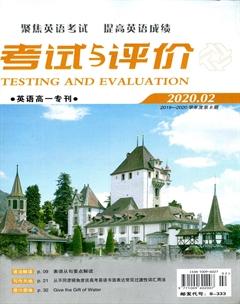必修3第4单元重点词语精讲精练
刘本龙
1. puzzle n. 难题;谜 vt. & vi. (使)迷惑;(使)为难
Their reason for doing it is still a puzzle to me. 他们为什么这样做对我来说仍是个谜。
Her reply puzzled me. 她的回答把我弄糊涂了。
【思维拓展】
be in a puzzle about... 对……迷惑不解;be a puzzle to sb. 对某人来说是个谜;work out a puzzle 猜谜,解决难题;puzzle over / about 苦苦思索;仔细琢磨;sth. puzzles sb. 某事使某人迷惑/为难;puzzle out苦心思索出(解决办法、答案等);be puzzled by... 被……迷惑;be / feel puzzled about / over 对……迷惑不解
【温馨提示】
puzzled adj. 迷惑不解的,作表语,表示主语(一般为人)所处的状态,还可以修饰人的表情;puzzling adj. 令人迷惑不解的,作表语,表示主语(一般为物)本身所具有的性质或特征。如:
I was puzzled how to solve the problem. 我不知道怎样解决这个问题。
The question is puzzling to me. 这个问题令我困惑。
【易混辨析】 puzzle与confuse的区别
puzzle意为“使迷惑,使难解”,指“情况错综复杂,因而使人感到困惑不解”;confuse意为“使困惑,把……弄糊涂”,指“把事物混淆或弄乱”或“由于混淆、混乱而糊涂”,语气较弱,常指暂时现象。
2. pull n. & vt. 拉(力);拖;牵引(力)
She pulled the drawer open. 她拉出了抽屉。
He told the children not to pull up the young plants. 他让孩子们别把幼苗拨起来了。
【思维拓展】
pull back 拉回來;缩回;使后退;pull down 拉下(窗帘等);拆毁;拆掉(房屋等);pull out 拔出;(列车等)驶出,出站;脱离;pull in(列车等)驶进,到站;靠岸,停车;pull together齐心协力;通力合作;pull through(使)渡过危机/难关;康复;pull up 把……往上拽,停车;pull apart 拉开,分开,扯断;pull away (汽车)开走;把……抛在后面;pull over靠路边停车;pull off (匆忙地)脱下(衣物);(成功地)完成;pull on (匆忙地)穿上或戴上
【易混辨析】 draw, drag和pull的区别
draw常用于比喻中,指吸引注意力等,通常指较平稳地也往往是比较从容地拉;drag往往指用大力气拖拉笨重物体,有“拖拉”的意思,意味着所拖的东西阻力很大;pull意为“拖、拉”,是普通用语,指用力拉,与push相对。
3. exist vi. 存在;生存
Several people believe the Devil exists in the world. 少数人认为世界上存在恶魔。
We can't exist without food or water. 没有食物和水我们就不能生存。
【思维拓展】
exist on 靠……生活;exist by 靠……方式为生;exist in 存在于……之中;exist as... 作为……而存在,以……形态存在;existence n. 存在;in existence 现存的;现有的;come into existence 产生;存在;bring into existence 使发生;使产生;使成立
【温馨提示】
exist没有被动语态,也不能用于进行时态。
4. in time及时;迟早;总有一天
I'll see him in time. 我迟早会遇见他。
Will we be in time for the six o'clock train? 我们来得及赶上六点钟的那趟火车吗?
【思维拓展】
against time争分夺秒地,尽快地;ahead of time提前,提早;all the time一直,始终;as time goes by 随着时间的推移;at no time绝不,在任何时候都不;at one time曾经,一度;at a time一次;at the same time同时;from time to time有时,偶尔;have a good time玩得愉快;in no time立刻,马上;at times有时;for the time being暂时,眼下;take one's time别着急,慢慢来
【温馨提示】
in time to do sth. / for sth. 来得及干某事,正好及时赶上……;at no time 绝不(用在句首时,句子要部分倒装)。如:
I was just in time to catch the flight. 我刚好来得及赶上那班飞机。
At no time was the man aware of what was happening. 那个人绝不会意识到发生了什么事。
【易混辨析】 in time与on time的区别
in time表示“及时”,意指正赶上时候或恰在需要的时候。如:
A child ran across the road in front of my car, but I managed to stop my car just in time. 有个小孩冲出马路跑到我的车前,不过我刚好及时把车停下来。
on time表示“准时;按时”,指正好在约定的时间发生。如:
The 11:45 a.m. train left on time. 上午11时45分的火车按时出发了。
5. prevent... from 阻止;制止
The guards stood at the doors to prevent anyone from leaving. 守卫站在门口阻止任何人离开。
Once he has made up his mind, no one can prevent him from carrying out the plan. 一旦他下定决心,谁也阻止不了他执行这个计划。
【思维拓展】
prevent... from= stop... from = keep... from使……不做……,阻止……做……,protect sb. from / against的意思是“保护某人使免受……”,from后接能带来伤害或损害之物。prevent / stop sb. from doing sth.中的from可省略,keep sb. from doing sth.中from不可省略;但如在被动语态中,三者的from都不可省略。注意:protect sb. from / against的意思是“保护某人使免受……”,from后接带来伤害或损害之物。
6. break out突发,爆发
They had escaped to America shortly before the war broke out in 1939. 1939年战争爆发前不久他们逃到了美国。
It was at midnight that a fire broke out. 就是在午夜发生了一起火灾。
【思维拓展】
break away from 脱离(政党等);打破(陈规等);break down出故障;抛锚;(计划等)失败;(身体、精神等)垮掉;break in 破门而入;突然闯入;打断(话语等);break into 破门而入;突然……起来;break off 折断;突然中止;断绝;结束;break through 突破;突围;break up 打碎;拆散;散開;解散,(学校)期终放假;(集会)结束
【易混辨析】 take place, happen, come about与break out的区别
take place 表示“发生、举行、举办”,一般指非偶然性事件的“发生”,即这种事件的发生一定有某种原因或事先的安排;happen作“发生、碰巧”解,一般用于偶然或突发性事件;come about表示“发生、产生”,多指事情已经发生了,但还不知道为什么,常用于疑问句和否定句中;break out意为“发生、爆发”,常指战争、灾难、疾病或者争吵等事件的发生。
【温馨提示】
take place, happen, come about和break out都不能用于被动语态。
【巩固训练】
根据所给汉语完成句子,每空一词。
1. 她几个星期也琢磨不透他那封奇怪的来信。
She's been ___ ___ his strange letter for weeks.
2. 老师让学生动脑筋自行寻找问题的答案。
The teacher left the children to _ _ _ _ the answer to the problem themselves.
3. 她脸上迷惑的表情表明她不明白我说的话。
Her ___ look on her face suggested she didn't understand what I said.
4. 我在末班火车驶出前到了。
I arrived as the last train was pulling ___.
5. 这些老建筑已经因为安全原因被拆除了。
The old building has been pulled ___ for safety reasons.
6. 医生说我很快就能康复。
The doctor said I was going to pull ___ soon.
7. 没有人知道这种风俗是什么时候产生的。
No one knows when such a custom ___ ___ ___.
8. 物体存在的形态有固体、液体、气体。
Matter can ___ ___ a solid, liquid, or gas.
9. 当你觉得有人威胁到你的生存的时候,你应该反击来拯救自己。
When you feel that someone is threatening your ___, you fight back to save yourself.
10. 医生让我一次吃三颗药。
The doctor told me to take three pills _ _ ___ ___.
11. 虽然他是个好学生,但是他有时会迟到。
Although he is a good student, he is late for class ___ ___.
12. 一听到这个好消息,他们就马上开心地跳起来了。
On hearing the good news, they jumped with joy ___ ___ ___.
13. 人们已经采取措施阻止河流污染。
Measures have been taken to ___ ___ ___ ___ ___.
14. 医生采取行动来防止这种疾病的蔓延。
Doctors took action to _ _ _ _ _ _ ___ ___.
15. 警察阻止他们携带武器。
The police ___ ___ ___ ___ ___.
16. 战争爆发时他才29岁。
He was 29 when the war ___ ___.

